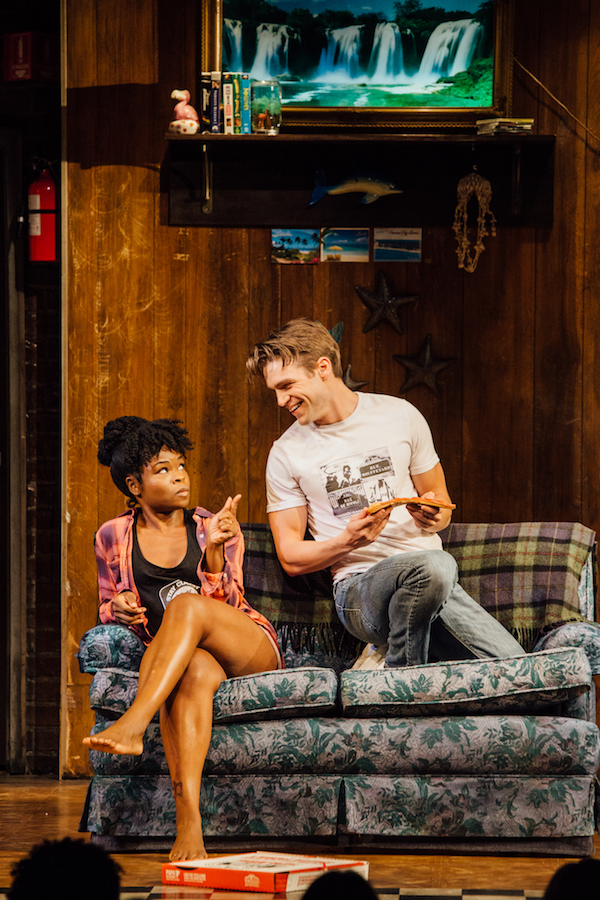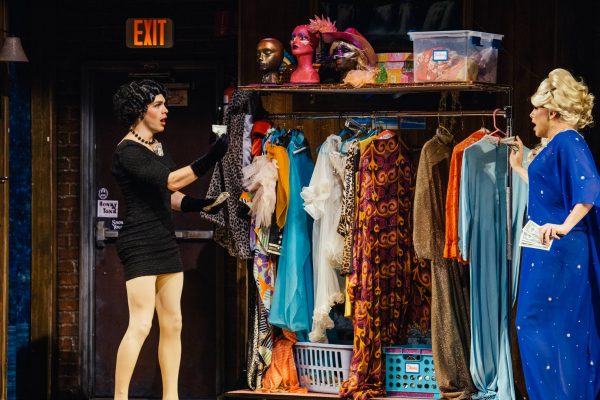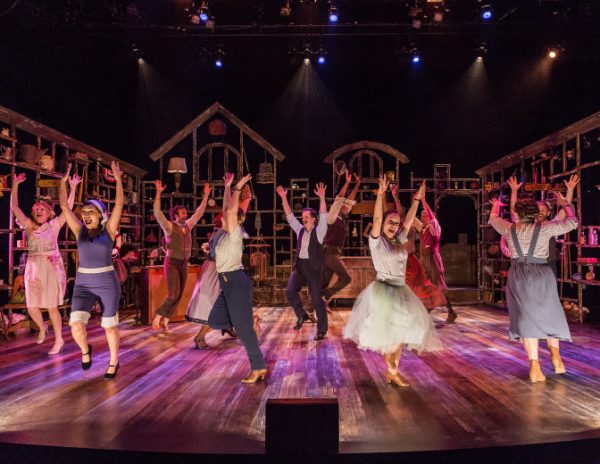If you’re looking for pure, unmitigated fun you could do a lot worse that getting yourself over to the Geffen Playhouse to see The Legend of Georgia McBride. It’s a story that emerged from playwright Matthew Lopez’s own experience growing up, as he put it, “gay and Puerto Rican” in Panama City, Florida. McBride is that rare bird: a raucous comedy with heart. It has plenty of impudence but no false pretensions, and it delivers laughter by the shovelful.
Confession: I was in on the birth of this play at the Denver Center Theatre Company (DCTC) in 2014 when, after making a splash as a reading at the previous year’s annual DCTC New Play Summit, it was chosen to receive a full production that became a hit. A few changes have been made since, and an off-Broadway production also surfaced between then and now, but there are no villains here. Only unexpected heroes.

The production at The Geffen was staged by Mike Donahue, the same director who helmed the ones in Denver and off-Broadway, and it also used the same scenic designer, Donyale Werle. Aside from the basic notion of a straight guy, and wannabe Elvis impersonator, becoming a drag queen in spite of himself (to make a living that will support him and his newly pregnant wife), there are too many spoilers for me to reveal much more. The surprises do keep coming though and they’ll keep you entertained. It all culminates in a very happy ending. Well, it’s a fairy tale. What did you expect?
Three things stand out: the wonderfully slapstick-comic parade of over-the-top drag costumes designed by E.B. Brooks; a gag-filled and splendidly timed performance by Matt McGrath as Miss Tracy Mills, drag queen-in-chief; and the tenderly playful puppy-dog performance of Andrew Burnap, as Casey, the young wannabe Elvis and happy husband who inherits his drag queen turn as McBride. (Truth be told, Burnap is a lot cuter as a boy than as a fake woman, but we’ll let that pass…) And, yes, some of the broad shenanigans overall could be toned-down a tad or two to become even funnier, but that is picking nits.

The recorded music offers some lively standards and one original song (“Lost and Found,” by Matthew Lopez and Joe Tippett), all lip-synched to a fare-thee-well by the queens, with humorous choreography by Paul McGill. The entire cast is delightful. It includes Nija Okoro as Casey’s sweet and worried wife Jo, Nick Searcy as the nightclub’s beleaguered and bewildered owner, Eddie, and, most notably, Larry Powell as Miss Tracy Mills’ former partner in crime named (in a strike of pure gold) Miss Anorexia Nervosa. Rexy for short.
Powell doubles as Casey and Jo’s friend and landlord Jason, who is married to a rent-devouring harridan we never meet since she sends him to extract the dough. Jason is the only role that has undergone an unwelcome change by going from memorable to kinda blank. As originally conceived, he was also being instructed by his demanding wife to improve on his spoken English — an effort that resulted in his use of big words that made for some of the show’s best whoppers. It was a sideways but important bit of fun that begs to be reinstated. (Matthew Lopez, are you listening…?)
So where did the idea for The Legend of Georgia McBride spring from?

“I started going to the gay bars in Panama City around the age of 16 or 17,” Lopez said in a 2014 Denver interview, “long before I was legally allowed to go in. The downtown had started to die… but this bar stayed open — for 40 years — and was the only gay bar in town. If you wanted to get a drink within a 15-mile radius you had to go to The Fiesta… I had never been in a place that was so accepting of who I am. I was able to be safe and be myself, and I was taken under the wing of the drag queens there…”
That was the inspiration. But what convinced him to write the play was a second-hand account of an artistic experiment. “I heard about a woman whose straight boyfriend was dabbling in drag as an art form,” he said, “a performance art project. They were putting together this persona for him.”
So for all of the fun that this imaginative confluence of happenstance, memory and talent delivers, The Legend of Georgia McBride ultimately is not just a comedy about drag, gay or straight people; it’s a comedy about everyone, a love story filled with dramatic opportunity: the novelty, the music, the dancing, the crazy, colorful costumes, the shabby glitz, the loyalties — and the growth and maturation of almost every character in the play.
It may not break new ground, but it reaches out with laughter, acceptance and kindness.
Top image: l-r: Matt McGrath and Andrew Burnap in The Legend of Georgia McBride.
Photos by Jeff Lorch Photography.
WHAT: The Legend of Georgia McBride
WHERE: Gil Cates Theatre at The Geffen Playhouse, 10886 Le Conte Ave., Los Angeles, CA 90024.
WHEN: Tuesdays-Fridays, 8pm; Saturdays 3 & 8pm; Sundays 2 & 7pm. Ends May 4.
HOW: Tickets $32-$90 (fees may apply), available in person or at www.geffenplayhouse.org or at 310.208.5454. Students: $25.

LET THE PARTY BEGIN…
Center Theatre Group launched its Block Party Sunday at the Kirk Douglas Theatre with the first of three productions plucked from the stages of smaller theatres in town. First in line is Philip Dawkins’ Failure: A Love Story, presented by the Cœurage Theatre Company (running through Sunday), followed by The Fountain Theatre’s production of Claudia Rankine’s Citizen: An American Lyric, adapted for the stage by Stephen Sachs (April 28-May 7), and finally the Echo Theatre’s staging of Ruby Rae Spiegel’s Dry Land (May 12-21).
The idea of offering this kind of space and opportunity is a generous one. It is also commendable as a way of recognizing work done on the smaller Los Angeles stages by giving them a crack at a larger one. The verdict on the experiment will rest primarily with the public.
Dawkins’ script for the first production, Failure: A Love Story, is a clever and complex language-based look at time — as in watches, clocks, grandfathers, coo-coos and the passage of. Given its many built-in abstractions, it is a piece that would be difficult to mount in any theatre with any budget. It is too broad and far-reaching for anything literal. So how to do it?
Like many youthful groups, the Cœurage Company took the playful route. With engaging music and songs, the large cast delivers a great deal of noisy, physically inventive, crowd-pleasing ensemble work (Michael Mathews is the director). But as imaginative as much of it is, it does not do justice to Dawkins’ script. His intricate humor is heavily word-based and, in this case, gets overwhelmed by all the clamor and hyperactivity on stage. The word games and their emphasis on time — items such as time spent, clocks and clanging and bells and ringing — cover the lifetimes of the three Fail sisters, their parents, their pets and other loved ones, and one fateful swim across Lake Michigan. Well, you can see why things eventually tend to blur together.
We do, however, live in a world addicted to multi-tasking, so why not a play with music and humor that does the same? This Failure may not be everything its author had in mind, but it will find its audience. In no time. That was already evident on opening night.

Photos by Craig Schwartz
WHAT: Failure: A Love Story
WHERE: Kirk Douglas Theatre, 9820 Washington Blvd., Culver City, CA 90232
WHEN: Tuesday-Friday, 8pm; Saturday, 2 & 8pm; Sunday, 1 & 6:30pm.
HOW: Tickets $25-$70 (subject to change), available at 213.628.2772,
on line at CenterTheatreGroup.org or in person at the Ahmanson theatre box office downtown or the Kirk Douglas box-office two hours prior to performance. Groups: 213.972.7231. Deaf community: info & charge at CenterTheatreGroup.org/ACCESS.
